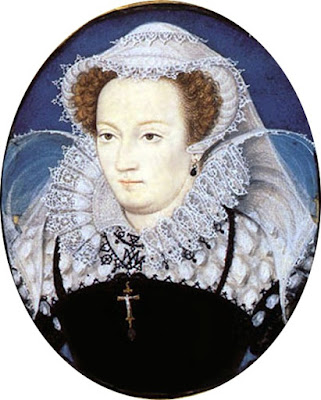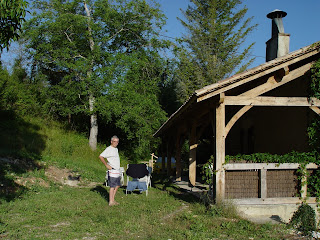 Those who live
in the north of England know only too well who the Border Reivers were! They inhabited the
counties that glare at each other across the English-Scottish Border: Northumberland,
Cumbria and Durham; Berwickshire, Roxburghshire and Dumfriesshire.
Those who live
in the north of England know only too well who the Border Reivers were! They inhabited the
counties that glare at each other across the English-Scottish Border: Northumberland,
Cumbria and Durham; Berwickshire, Roxburghshire and Dumfriesshire.
The Pennines
form the backbone of the Durham Dales and proved a barrier, though the Eden
Valley provided an easy route to rich pickings. Every northerner knows the story
of the monks at Blanchland in County Durham who cowered in their church as the
Scots raiders passed by on their way home to Scotland. Relieved, they rang the
bells in thanks. The Scots heard the bells, turned back and raided the little
village hidden in its deep valley.
George
MacDonald Fraser described the reivers in his book The Steel Bonnets: “not the most immediately lovable folk in the
United Kingdom. Incomers may find them difficult to know; there is a tendency
among them to be suspicious and taciturn, and the harsh Border voice, whether
the accent is Scots or English, lends itself readily to derision and complaint.
No doubt there are Cumbrians who are gay, frivolous folk, and Roxburghshire
probably has its quota of fawning, polished sophisticates; they are in a
minority, that is all.”
Qualities
such as those he described were forged in harsh times which passed by most of
Britain. From the late thirteenth century to the middle of the sixteenth, the
Borders were frequently a war
zone. During those times armies marched in both directions across
the Border lands, burning, stealing and despoiling as they went, for armies must
eat, and the people of the Borders bore the brunt of it.
When the
army seized a man’s crops and livestock, there was nothing he could do to
support himself and his family but relieve his neighbours of the goods he
needed. If the neighbour was in the same situation, then they joined forces and
foraged further afield. Nationality was not a consideration in such desperate
times; Scot raided Scot as readily as they robbed the English, and the English
were not averse to raiding an English farm if needs must. Scots helped the
English raid north of the Border and Englishmen aided Scots raids south of the
Border. Families such as the Grahams had members straddling both sides of the line
and no one ever knew for certain which side they would support on any given day.
In times of
peace, the raiding went on. Habits once formed, died hard. Feuds developed,
some across the Border divide and some within it. The Maxwells feuded with the
Johnstones in one of the bitterest and bloody battles known in Scotland, yet
now no one knows how or why it began; possibly a power struggle for supremacy
between two powerful tribes that turned the Debateable Land
into a wasteland according to Lord Dacre in 1528. Twenty years later Lord
Wharton was busily fanning the flames to secure England’s interests and both
clan leaders found themselves in and out of English prisons on an almost
regular basis.
National
policy tried to stop the lawlessness. The Borders were divided into six
administrative areas known as the Marches and England and Scotland each
appointed three March Wardens whose task was to defend against invasion in time
of war and put down crime and maintain law and order in peace time. Some were
good men and others were the worst raiders of the frontier. A Warden often used
one reiving family to help them catch another. Tracking thieves on horseback in
the dark across trackless and boggy wastes was not an easy task and no Borderer
was about to betray another Borderer unless it brought him profit or it played
into his feud.
Sex took no
notice of national policy and intermarriages across the Border were common. Cattle
rustling and protection rackets abounded. The words blackmail and kidnapping came
into the English language via the Borderers. Overpopulation of the more fertile
dales and greedy landlords contributed to the problems. The Tynedale
custom of dividing a deceased man’s land among all his sons resulted
in a situation “whereby beggars increase and service decays.”
Homes all
over the Border were makeshift things in many cases. Often burned down, they
were rebuilt astonishingly quickly out of clay and stones, sometimes turf sods
with roofs of thatch. Larger villages had more substantial dwellings of stone
and oak timbers. The
Bastle was smaller, (https://en.wikipedia.org/wiki/Bastle_house)
built on the same lines as a peel tower, which was more secure still; built of
stone with massively thick walls. There was only one entrance at ground level,
with two doors, one a yett – an iron grating - and the other of oak reinforced
with iron. A narrow curving stair known as a turnpike led to upper floors.
Usually they curved clockwise so a defender retreating to an upper storey had
his unguarded left side to the wall; the man attacking up the stair was at a
disadvantage with his sword arm to the wall. The Kerrs, notoriously
left-handed, built their turnpikes anti-clockwise. http://www.peelcastle.co.uk/ or https://en.wikipedia.org/wiki/Smailholm_Tower
The standard
of living was generally higher in towns such as Berwick or Carlisle, but the
daily food ration of a soldier in the Berwick garrison in 1597 would not satisfy
us today; he received a daily ration of a 12 oz loaf, 3 pints of beer, 1½ lbs
of beef, ¾lb of cheese and ¼lb of butter. If that was what the English army
lived on, consider the diet of peasant farmers whose crops have been trampled
into the mud by an army passing through.
The people
of the Border have not changed much in four hundred years; the Descendants of
the Elliots, Armstrongs and Fenwicks, Bells and Nixons, Scotts, Maxwells and
Kerrs are still living roughly where they were in the sixteenth century. It is
not exaggerating to say that they form a distinct cultural and social bloc that
is different from the rest of the British people.
There are
poems, songs
and tales told about the famous names that have come down through the years.
The names alone give a flavour of the times: Kinmont Willie, Black Ormiston, Hobbie
Noble, Fingerless Will, Nebless Clem, Willie Kang, Bangtail, Fire the Braes.










